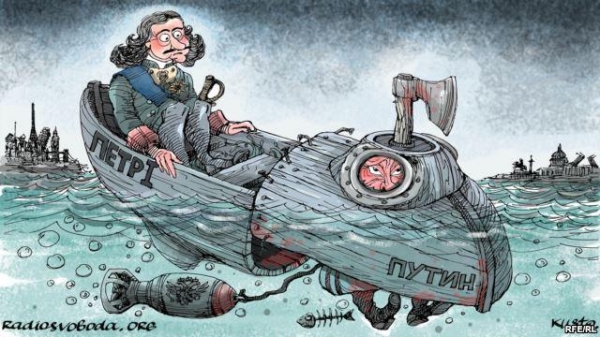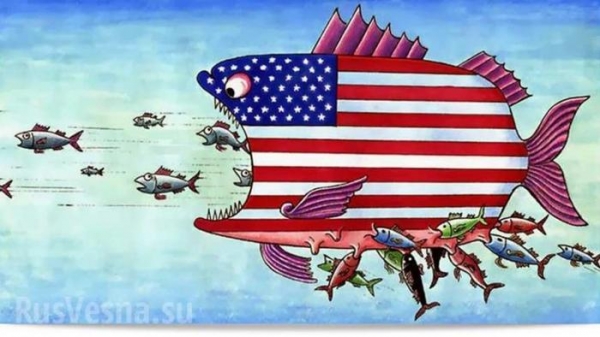Political scientist Stepan Sulakshin: the rossiefobiya different from Russophobia
 Image copyrightРИА Novostima captionПолитолог Stepan Sulakshin urges not to consider the opposition Russophobia
Image copyrightРИА Novostima captionПолитолог Stepan Sulakshin urges not to consider the opposition Russophobia
A former ally of Vladimir Yakunin, a political scientist and Professor Stepan Sulakshin won a grant to write the work “Technology of cultural de-Russification (rosieposie) and state government responses to the challenge” at the cost of 1.75 million. He told the Russian service Bi-bi-si, as will be this study.
In 2013, Professor Stepan Sulakshin worked with the then head of Russian Railways Vladimir Yakunin, the favorite “victim” of investigators under the leadership of Alexey Navalny. Now they do not communicate.
- Peskov called Russophobia assertions about the relationship of fans with the Kremlin
- In Moscow discussed the intricacies of “Russophobia”
Sulakshin consider themselves in the opposition, and the current political system is bankrupt, but still won a grant from the Ministry of culture a cost of 1.75 million.
The Professor told the Russian service Bi-bi-si, as the Russian authorities to improve the image abroad than rossiefobiya different from > > what does the fifth column.
Bi-bi-si: Let’s start with something simple what is rossiefobiya?
Stepan Sulakshin: a psychological term, which means the alarm, unfounded prejudice, rejection. The reasons are of different origin. For example, everyone is afraid of attacks from behind, all afraid of the dark. In this case, in a direct, literal sense, rossiefobiya – unprovoked fear associated with Russia.
This phenomenon of inter-state and him for centuries. It is not unique, but our country has become urgent in connection with mezhgosudarstvennyi complications, isolation, sanctions, bad external policy of the country.
In scientific terms, his study, both in terms of the nature of historical manifestations, Genesis, and part of the actual projections on foreign policy, of course, interesting and very important.
It was therefore not surprising that the Ministry of culture, because we have the Ministry of psychology, and the foreign Ministry in this respect is rather limited… it was, probably correctly, that the Ministry of culture paid attention to this problem.
Bi-bi-si: If we are talking about the conditions of the tender and name of work which you need to write, what is “cultural de-Russification”?
S. S.: There is a terminological and substantial problem. When English or any other language says “English” in him [in this word] is invested primarily that of the state nationality, but not ethnicity.
When it comes to de-Russification, it has two problems – squeezing Russia as a subject of political relations and the squeezing of cultural, linguistic, informational, filmic, and bibliographical. The ethnic moment – he’s here in the fifth or sixth semantic priority.
Bi-bi-si: is There a difference between recievable and Russophobes?
S. S.: Rossiefobiya is [about] the state Russophobia is [about] ethnic group. But very few people understand it – and trying to bring national, international issues. It’s wrong, it’s not.
Bi-bi-si: what are the state And the management responses on the part of Russia in this case should be?
S. S.: They lie in the field of so-called soft power such as language, cultural power abroad. Not what is called “Russian world”, which is pretty semantically confused and tainted in connection with the Crimean and Ukrainian Affairs.
It’s about the fact that Russia is a type of state-civilization, which has United the many lands, peoples, ethnic groups, languages, cultures over the centuries. And all this alloy was shown to the world.
But in recent decades, the alloy is somehow embarrassed to have forgotten that he has a tremendous accumulation of cultural, civilizational, historical. They need to present the world, all the great powers. Not just an external political activities, and external activities, with a focus on the humanitarian piece.
Bi-bi-si: the same technical specifications used, for example, the expression “fifth column”. How would you define this term?
S. S.: This is already a publicized quote of President Putin. He after the annexation of Crimea and challenges encountered publicly announced that there are national traitors and “fifth column”. The standard idea of a “fifth column” historically means the mechanism of de-sovereignization of the state administration.
To claim that the “fifth column” is Russophobic community is unreasonable. Because the mix of problems and conceptual field. Russophobia – ethnic category, and “fifth column” – political.
To claim that the “fifth column” is Russophobic community – unreasonably
Bi-bi-si: the state Duma Deputy Dmitry Goodcommentguy that formulation of materials in the procurement documents coincide with the wording of the articles of Vardan Baghdasaryan, co-author Vladimir Yakunin. You these two names should be familiar.
S. S.: Yes, I worked with them. Baghdasaryan continue to work.
Bi-bi-si: what about you now an opposition leader, the relationship with Yakunin?
S. S.: Mr Yakunin they are all in the memories. I am very grateful to him for the period when we worked together, but today no relations at all. But Professor Baghdasaryan is great, one of the leading scientists in modern Russia. Most likely, we will attract.
Generally, when one subject intersected by several people – this is not surprising, because besides these few people professional eye to dwell any more on whom.
Bi-bi-si: do you Think the opposition Russophobes?
S. S.: No, not at all. I consider myself as a citizen, from the point of view of political activity, to the opposition. I am convinced that the current political system is bankrupt. He left not so long, and he will make Russia very big problems and turmoil.








